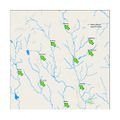Difference between revisions of "ISSS608 2017-18 T3 Assign Yeo Kaijun Method"
Jump to navigation
Jump to search
| Line 35: | Line 35: | ||
File:Waterways Final.jpg|Caption1 | File:Waterways Final.jpg|Caption1 | ||
</gallery> | </gallery> | ||
| + | Firstly, there are 4 main exits of the waterway (Decha, Tansanee, Sakda & Kannika) The pollutant values of these 4 exits will be analyzed. | ||
| + | |||
| + | Next, upon spotting higher pollutant values in either of the exits, further investigation will be done on the sampling areas of each exits | ||
| + | |||
| + | To ensure recency of the data, only values from the recent 5 years will be used in the analysis | ||
| + | |||
<br><br> | <br><br> | ||
[[Assignments|<font face="Segoe UI Light" color="#3C33FF">Back to Assignments</font>]] | [[Assignments|<font face="Segoe UI Light" color="#3C33FF">Back to Assignments</font>]] | ||
Revision as of 00:49, 7 July 2018
VAST Mini Challenge 2: Methodology
|
|
|
|
|
Methodology
The data will be analyzed upon 3 different methods:
1. Comparison between different areas
2. Comparison across time
3. Comparison with a standardized water quality criteria
1. Comparison between different area
Firstly, there are 4 main exits of the waterway (Decha, Tansanee, Sakda & Kannika) The pollutant values of these 4 exits will be analyzed.
Next, upon spotting higher pollutant values in either of the exits, further investigation will be done on the sampling areas of each exits
To ensure recency of the data, only values from the recent 5 years will be used in the analysis
